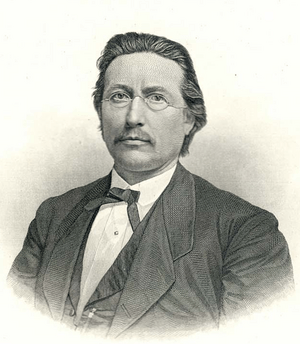Henry Baetz facts for kids
Quick facts for kids
Henry Baetz
|
|
|---|---|
 |
|
| 6th State Treasurer of Wisconsin | |
| In office January 3, 1870 – January 5, 1874 |
|
| Governor | Lucius Fairchild Cadwallader C. Washburn |
| Preceded by | William E. Smith |
| Succeeded by | Ferdinand Kuehn |
| Personal details | |
| Born |
Henry Baetz
July 27, 1830 Stockhausen, Hesse |
| Died | January 2, 1910 (aged 79) Wisconsin, U.S. |
| Resting place | Evergreen Cemetery Manitowoc, Wisconsin |
| Political party | Republican |
| Military service | |
| Allegiance | |
| Branch/service | Union Army |
| Years of service | 1862–1863 |
| Rank | |
| Unit | 26th Reg. Wis. Vol. Infantry |
| Battles/wars | American Civil War
|
Henry Baetz (July 27, 1830 – January 2, 1910) was an important figure in Wisconsin. He was a German American who came to the United States. He worked as a real estate and insurance agent. Baetz also served as the 6th State Treasurer of Wisconsin, which means he was in charge of the state's money. He was a brave officer in the Union Army during the American Civil War and was even wounded at the famous Battle of Gettysburg.
Contents
Early Life and Moving to Wisconsin
Henry Baetz was born in a place called Stockhausen, in what was then the Grand Duchy of Hesse. Today, this area is part of Germany. In 1853, when he was 23 years old, he decided to move to the United States.
He first settled in Two Rivers, Wisconsin. Later, he moved to Kewaunee, Wisconsin, before finally making his home in Manitowoc, Wisconsin.
Serving in the Civil War
When the American Civil War began, Henry Baetz volunteered to join the Union Army in 1862. He became a captain on September 9, 1862. He led Company F in the 26th Wisconsin Volunteer Infantry Regiment. This regiment was made up of many German American soldiers.
The regiment was formed in Milwaukee and left Wisconsin on October 6. They were sent to the Eastern part of the war, joining the XI Corps in the Army of the Potomac.
Key Battles and Injuries
Captain Baetz was promoted to major on March 15, 1863. This happened just before the Battle of Chancellorsville. His regiment fought bravely at Chancellorsville, where they faced intense combat. The 26th Wisconsin suffered many losses, with 177 soldiers wounded or killed. Their colonel was also injured.
After Chancellorsville, Major Baetz became the second-in-command of his regiment. They then moved on to the Battle of Gettysburg, one of the most important battles of the war. On the first day of fighting, Major Baetz and his unit were ordered to defend a position north of the city. However, Confederate soldiers got there first.
The XI Corps had to set up defenses in a field and soon came under heavy attack. During this fierce fighting, both Major Baetz and his commanding officer were wounded. Because of his injuries, Major Baetz had to leave the Army on October 8, 1863. He then returned home to Wisconsin.
A Career in Politics
After the war, Henry Baetz became very active in politics. In 1857, he served as the town clerk for Manitowoc. He was then elected as the Register of Deeds for Manitowoc County in 1858 and again in 1860. He also served as the State Treasurer for Manitowoc County in 1866 and 1868.
In 1868, Baetz was chosen to be a delegate at the 1868 Republican National Convention in Chicago. At this convention, Ulysses S. Grant, another famous Civil War general, was chosen to run for President of the United States.
State Treasurer of Wisconsin
In 1869, Henry Baetz was elected as the State Treasurer of Wisconsin. He served alongside Governor Lucius Fairchild, who was also a veteran of the Battle of Gettysburg. Baetz was re-elected in 1871, serving two terms in this important role. He decided not to run for re-election in 1873.
In 1875, he moved to Milwaukee. From 1878 to 1880, he held another interesting job: he was the first chief librarian for the Milwaukee Public Library. He returned to state government in 1880, working as the Secretary of the State Board of Immigration until 1883.
Henry Baetz passed away on January 2, 1910.
 | Victor J. Glover |
 | Yvonne Cagle |
 | Jeanette Epps |
 | Bernard A. Harris Jr. |

